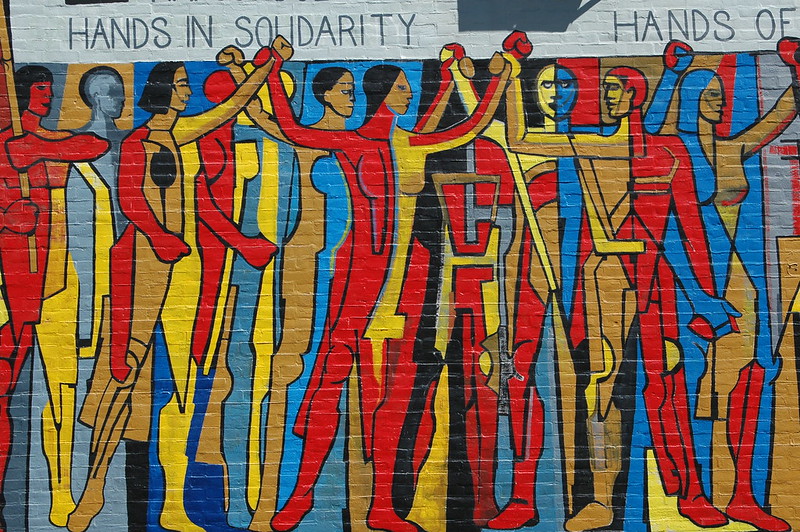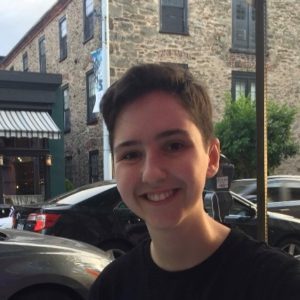How do we fight anti-Semitism? On November 14th, New York Times contributor and pro-Israel opinion writer Bari Weiss was hosted by the Jewish Federation of Greater Philadelphia to give her answer. I stood outside with a group of young Jewish anti-occupation activists from IfNotNow Philadelphia to give ours.
Weiss’s rhetoric represents what too many Jewish-American establishment leaders believe: that the fight against anti-Semitism must come at the expense of Palestinian lives. In Weiss’s book, How to Fight Anti-Semitism, she answers her own question by creating a false equivalency between right-wing anti-Semitism and pro-Palestinian progressive thought. While Weiss does address the persistent anti-Semitic rhetoric of right-wing politicians and white nationalists, she also pins far too much blame on Muslim communities and the left, taking an entire chapter of her book to focus on “radical Islam” and conjuring images of pro-Palestinian, and thus anti-Semitic, progressives.
As part of the Jewish Federation’s largest annual event, Weiss’s keynote address was heavily attended. As I stood on the sidewalk outside of Philadelphia’s Kimmel Center with other members of IfNotNow, attendees walked past. We refused to seem angry. Instead, we sang out joyfully, showing pride in our Jewishness and the values Judaism has instilled in us.
Oseh shalom bimromav, hu ya’aseh shalom aleinu, v’al kol yisrael, v’al kol yosh-vei tevel. May the one who creates peace on high bring peace to all of us and to all of Israel and to all who inhabit the earth. We handed out flyers, gave speeches, and chanted out our own vision of a peaceful future: our solidarity will defeat white nationalism.
As a young Jew, I understand the anxieties of Bari Weiss and many of our community members. Like them, my generation has watched in horror as news of the murders of our Jewish siblings in Squirrel Hill and Poway rolled across our television, tablet, and phone screens. We too are aware that anti-Semitism is on the rise and we too fear for our safety and the safety of our loved ones. Anti-Semitism is real and terrifying.
For a long time, Jewish Americans have sought safety in acceptance from and proximity to mainstream, white, Christian society. And if we choose to fight for our safety by further assimilating into the mainstream, it is all too easy for us to take our anxieties about anti-Semitism out on Muslims, progressive people of color, and activists fighting for Palestinian liberation. But these people are not our enemies.
We cannot defeat anti-Semitism in isolation. In fact, it is the same ideology that puts all of us – Jews, Muslims, Palestinians, and people of color – at risk of violence. From the Squirrel Hill massacre to the murders of civilians in Gaza, systems of power and white supremacy oppress marginalized people around the world.
The people who murdered Jews in Squirrel Hill and Poway hated people of color as much as they hated us. But Jewish leaders like Bari Weiss encourage us to turn our backs on these other groups, instead of uniting to focus our energy on fighting the larger forces of white supremacy, of which anti-Semitism is a crucial component. When we follow Bari’s advice we do ourselves a disservice. More importantly, we ignore the voices of Palestinians who face daily violence and the activists who are pleading with the Jewish establishment to take accountability for Israeli human rights abuses.
We are right to be scared and frustrated. We are right to be anxious about anti-Semitism and worry about the safety of our communities. Rather than cling on to the privileges many Jews (especially white Jews) have gained in recent generations, we should use our position to advocate against all forms of white nationalism, and stand up for all its victims.
Some of the people walking into Weiss’s event spoke with us. Some seemed to even agree with what we had to say. Others did not. Like Weiss, they seemed to believe that we can only fight anti-Semitism in isolation, by ignoring the plights of Palestinians, Muslims, and people of color.
Young Jews like me fight for Jewish liberation through solidarity. We respond to her rhetoric of isolation with a call for coalition-building. Our presence outside of Weiss’s keynote event made sure that her answer to the question “how do we fight anti-Semitism?” would not go un-challenged.
My generation knows that fighting white supremacy in solidarity with marginalized communities, especially Palestinians, is what will truly bring about a safer and more just society for all of us.
Featured image credit: Flickr.com/Terrence Faircloth.

